If you’re nuts about nuts, specifically almonds, you’ve come to the right place! Almonds are not only delicious but also packed with health benefits. In this comprehensive guide, we’ll dive into everything you need to know about almonds, from their nutritional advantages to tips on buying and exploring the different types available. Whether you’re a seasoned almond enthusiast or a newcomer to the world of nuts, get ready to discover the wonders of these versatile and nutritious gems!
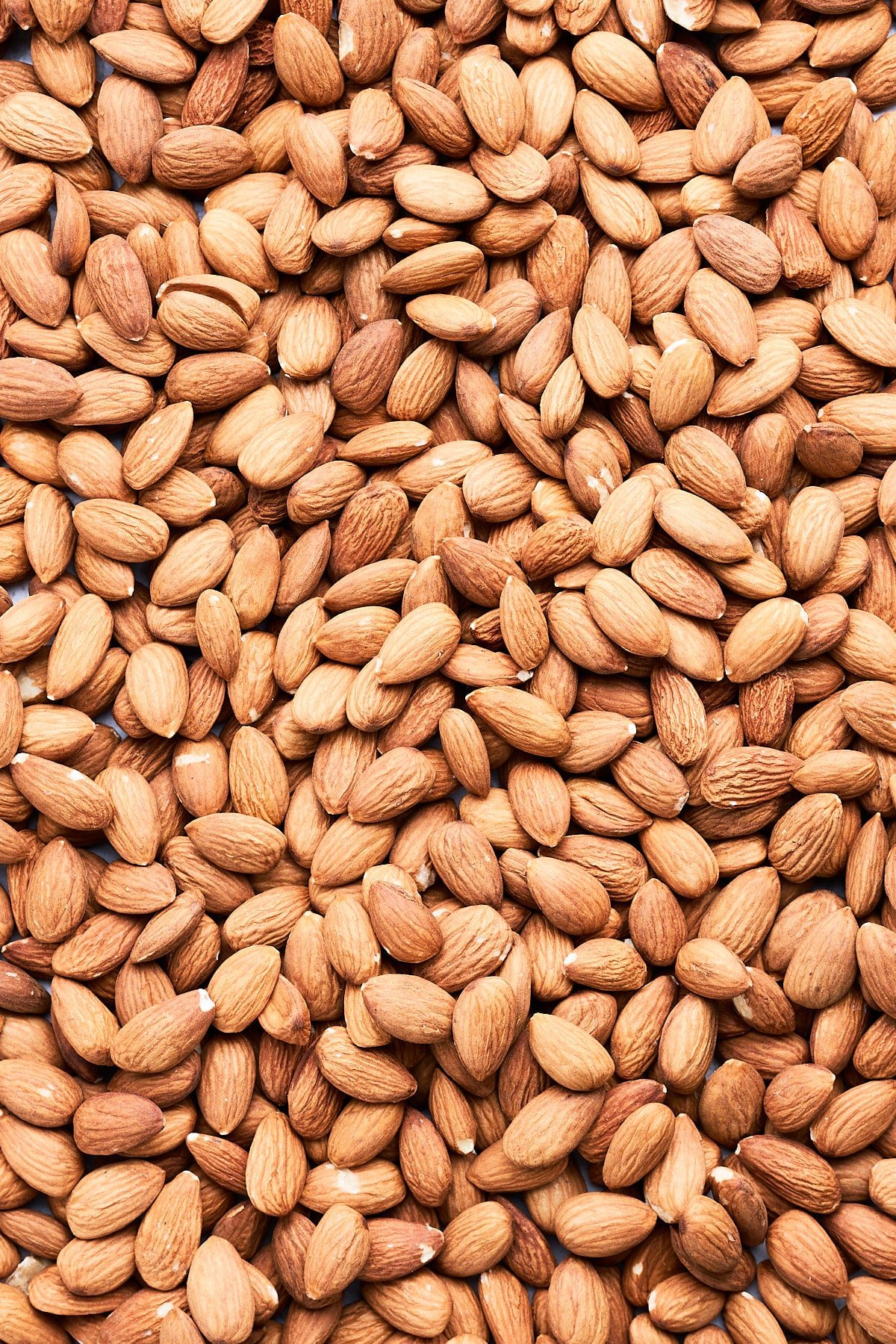
What are Almonds?
We should probably start with the very important fact that almonds are not, in fact, nuts. Almonds are actually the seed of a fruit from the almond tree. Like cherries, peaches, and plums, that fruit is a stone fruit, having a fleshy fruit exterior and a pit on the inside.
So what the heck is a nut then? Well true nuts have a hard outer shell (think acorns or chestnuts). If it makes you feel better, the food world has taken to calling almonds “culinary nuts” (so as to make them feel included). But whatever you call ‘em, almonds are delicious and nutritious!
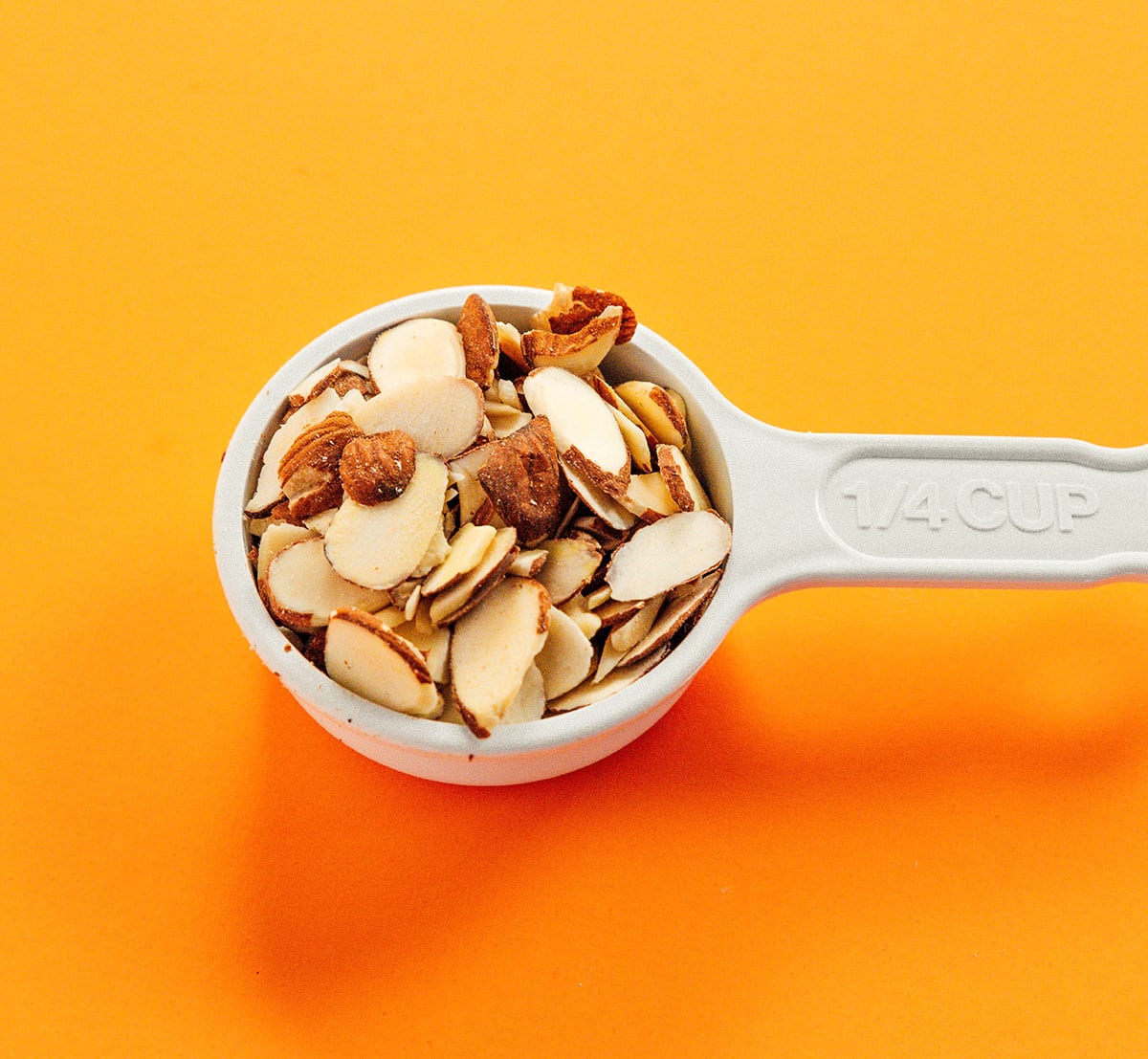
Types of Almonds
There are a number of almond varieties, but you’ll probably only have a variety or two in your local grocery. So today let’s just look at the different ways you might buy almond products in your average store.
- In Shell: These are just plain almonds exactly as they come, in their hard shell.
- Kernel: The part we eat is the kernel of the seed. These can either come natural (unprocessed) or blanches (brown skin removed).
- Slices or Flakes: Thinly sliced and either natural or blanched, these are great for topping salads or garnishing desserts.
- Slivers: These are split lengthwise into quarters (ish), so they’ve got a bit more crunch than sliced almonds. These are great for adding texture to foods.
- Meal: This has a flour-like consistency. You can use it as a thickener, flavor enhancer, to coat pan-fried/fried foods, or in place of wheat flour in some gluten-free recipes.
- Milk: Almonds and water are pulverized then strained to create a delicious faux milk! Learn to make your own almond milk.
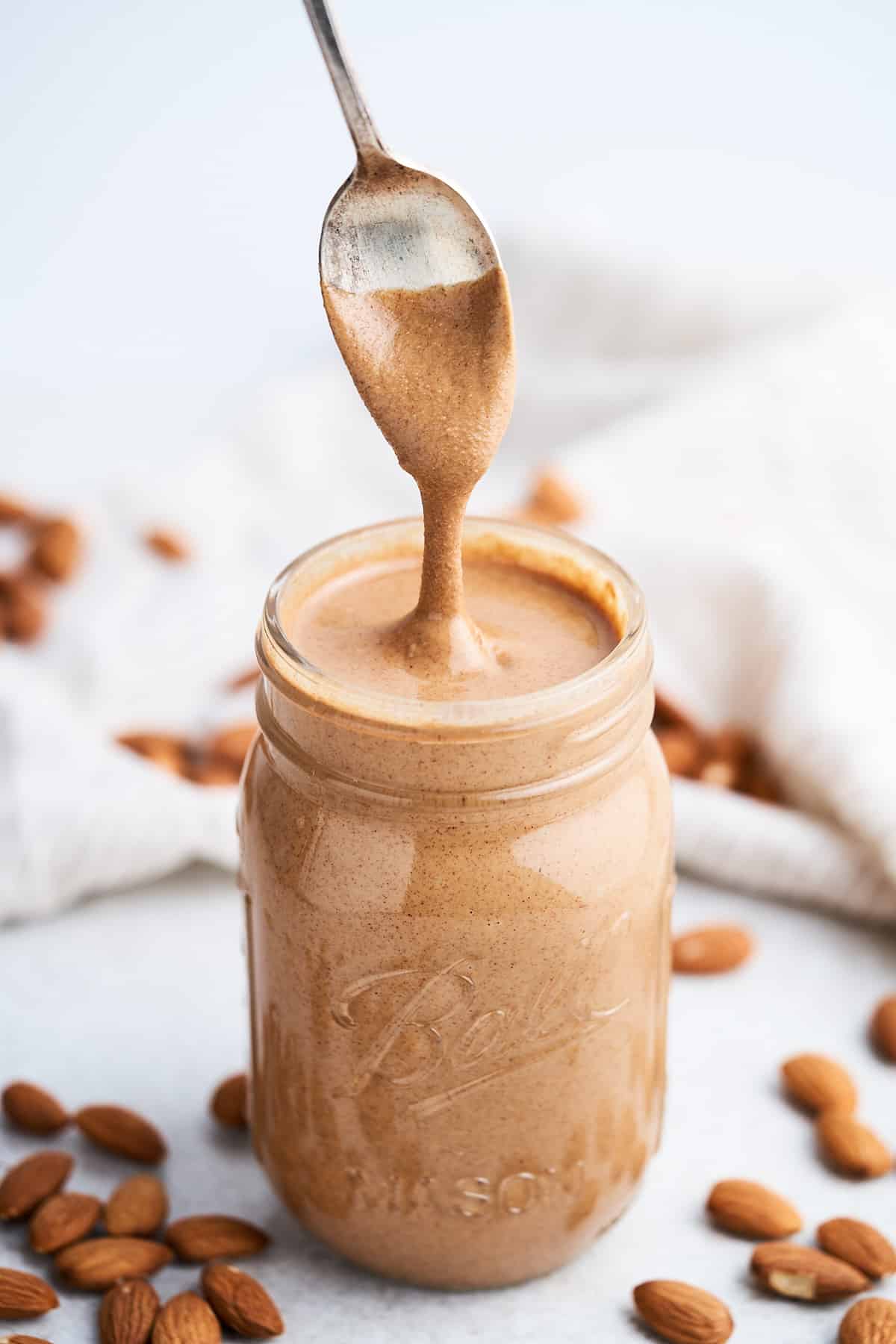
How to Store Almonds
Store almonds in an airtight container in a cool, dry place. They’ll stay good in the fridge for quite a few months, and in the freezer for up to 2 years.
Almonds like to absorbs odors, so try to keep them away from smelly foods, like garlic and onions.
Almond Flavor Combos
Fun fact: You can substitute apricot kernels for almonds in baking (like for making almond paste!) But fun facts aside, here are some flavors that (according to the Vegetarian Flavor Bible), go really well with almonds. You can use these as a starting point for your own cooking experimentation!
- Other stone fruits (cherries, peaches, apricots, plums)
- Berries
- Chocolate
- Dates
- Garlic
- Lemon
- Maple Syrup
- Oranges
- Rice
- Vanilla

Almond Health Benefits
Almonds offer a treasure trove of health benefits that make them a superfood worth adding to your diet. These crunchy delights are rich in heart-healthy monounsaturated fats, which can help lower bad cholesterol levels and reduce the risk of heart disease. Packed with vitamin E, antioxidants, and essential minerals like magnesium and calcium, almonds contribute to strong bones and support overall immune function. Additionally, their high fiber content aids in digestion and helps with weight management by promoting feelings of fullness. With their impressive nutrient profile, almonds are a delicious and wholesome addition to any balanced diet.
The following nutrition information is per 1 cup of whole almonds.
Calories in 1 cup of almonds: 822
Almonds are not a low calorie food, which is why the serving size is much less than 1 cup (a typical serving size for almonds is 1/4 cup, or about 23 almonds).
Carbohydrates: 31 g
Almonds are not a low carb food, although most of the carbohydrates in almonds come from fiber (meaning the net carbs for almonds are actually much less).
Fiber: 17 g
1 cup of almonds contains most of the fiber you need in the day, 70% of your daily value!
Protein: 30 g
Almonds are a great source of plant-based protein.
Fat: 71 g
Like most types of nuts, almonds are high in healthy fats.
187% Daily Value of Vitamin E
Almonds are a good source of Vitamin E (a.k.a Tocopherols and Tocotrienols), a fat-soluble vitamin that acts as an antioxidant, helping to maintain your immune system.
38% Daily Value of Calcium
The most abundant mineral in the body! 0.1% of the calcium in your body plays a vital role in vascular contraction/dilation and nerve transmission and signaling. The other 99% supports teeth and bone structure and function.
30% Daily Value of Potassium
There is a high amount of potassium in almonds, a key mineral and electrolyte involved in countless processes, including healthy nervous system functioning and contraction of the heart and muscles!
What Are Activated Almonds
Did you know you can make almonds even healthier by activating them? Activated almonds are simply almonds that have been soaked then dehydrated. The process increases their digestibility!
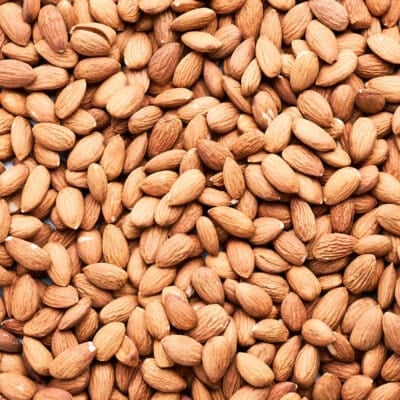
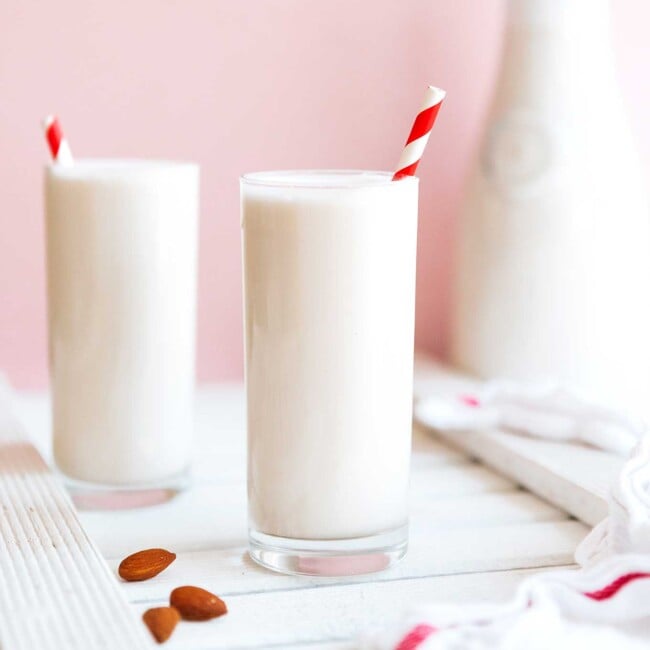

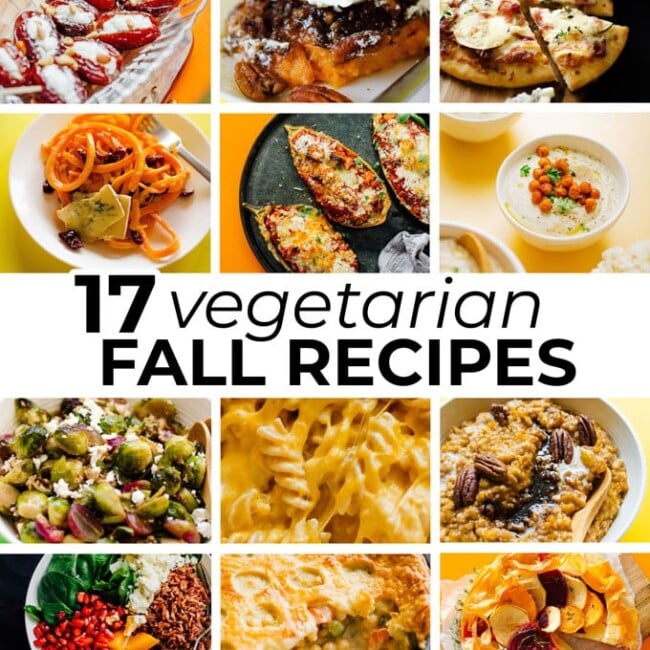
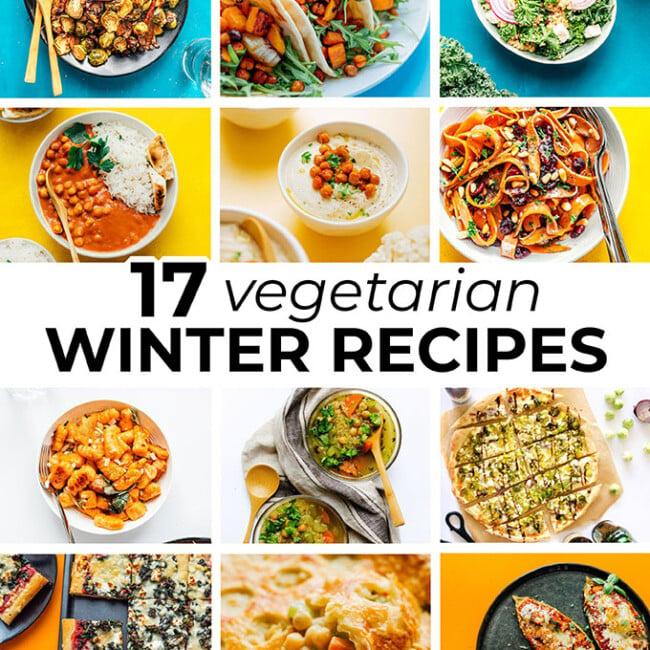
wayne reynolds says
When I slice some almonds with my knife I find some gewy oily stuff
Is that stuff bab to eat? What is it ?
Sarah says
Almonds naturally contain oils, so it could be that. But I’ve never encountered what you’re experiencing, so I’d err on the side of caution and probably not eat them!
Concerned Mom! says
Can Almonds make you sick in flour form? My son has an allergy to Peanuts and Tree Nuts . Would Almonds be in that group?
Sarah Bond says
Almonds are a type of tree nut, so he would be allergic to those!
Sharon says
Am I losing nutrients by using blanched almonds? What is in the brown skin that I’m not getting ?
Sarah Bond says
There are some added nutrients in the skin (fiber and polyphenols). But it also contains tannins that can prevent absorption of some nutrients. So really…it doesn’t matter much if they’re blanched or unblanched!